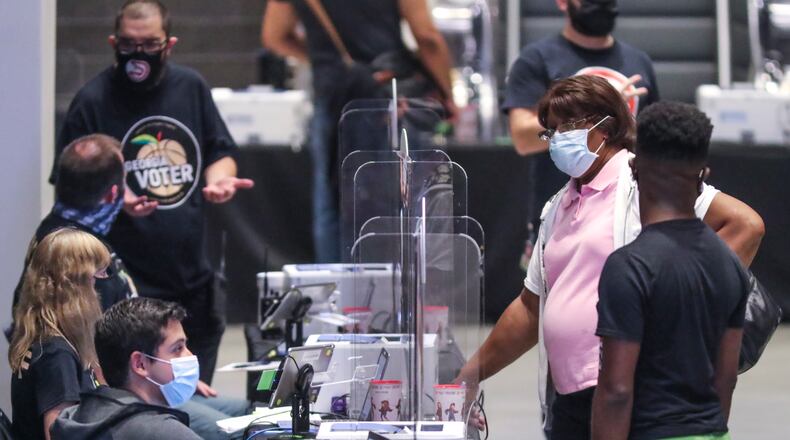Voting slowed to a crawl across Georgia this week in large part because of a check-in computer system that couldn’t handle the load of record turnout at early voting locations.
The problem created a bottleneck as voters reached the front of the line, when poll workers had to deal with sluggish laptops to verify each voter. Some early voting sites reported checking in just 10 voters per hour at each computer.
The computer problem shows why poll workers struggled to clear long lines: They could only move as quickly as the technology would let them while managing 243,000 voters in the first two days of Georgia’s three-week period of early voting.
Secretary of State Brad Raffensperger initially attributed the lines to high turnout, which is part of the reason for delays. But it became clear from interviews with poll workers, election officials and voters this week that technical difficulties contributed to severe waits.
Raffensperger said Wednesday that he’s working with the state’s election software company to improve speeds and process voters more quickly.
Later in the day, his office said the state’s elections software vendor, New Orleans-based Civix, had increased bandwidth, resulting in immediate improvements reported by many counties. Wait times fell from over three hours to about one hour Wednesday afternoon at several early voting sites in metro Atlanta.
Credit: Alyssa Pointer / Alyssa.Pointer@ajc.com
Credit: Alyssa Pointer / Alyssa.Pointer@ajc.com
County election officials said the problem needed to be fixed quickly before early voting turnout rises even higher as Election Day approaches.
“We know that in the last week of early voting we can’t have this situation,” said Cynthia Willingham, elections supervisor in Rockdale County. “Our voters are going to come in numbers, so across Georgia we don’t want to have eight-hour lines. We need the system to work as it should.”
Checking in voters should take about a minute, not four or five minutes, Fulton County Elections Director Richard Barron said.
“If there isn’t a resolution before Week Three, it’s going to get really bad,” Barron said. “The voters see empty ballot-marking devices and they’re wondering why more people aren’t being processed.”
Raffensperger said turnout — about 35% higher than the start of early voting in 2016 — taxed election computers like never before in Georgia elections. When combined with absentee ballots, over 742,000 people had already voted through Tuesday.
“It’s just a lot of people running down that same road right now,” Raffensperger said at a Capitol press conference. “It’s like everyone jumping on 285 in the morning, and sometimes you have to stagger out the rush hour.”
The problem occurred on eNet, a computer system that maintains the voter registration and absentee ballot information for Georgia’s 7.4 million registered voters.
The online system is used by election workers across the state to look up voters' registration information, check them in at early voting locations and scan absentee ballots as they arrive at county election offices.
The eNet system was unable to efficiently process so many requests at once, causing delays.
Voters felt the consequences of the tech troubles, standing outside crowded polling places for hours before they reached the front of the line.
Christopher Stewart said he waited 15 minutes to be checked in Wednesday following a long wait at the Sandy Springs Library in Fulton County. He saw some people leave the line without voting.
“I think 2 1/2 hours for system issues is pretty difficult to deal with,” Stewart said after voting. “I understand when you vote in person you’re going to wait, but for system issues, that’s something I would expect (election officials) to address.”
Poll workers such as Dallas Thomas are also frustrated.
Since early voting started, poll workers have had trouble connecting to the state’s voter network to check in voters, Thomas said.
“Yesterday was almost to the point of a complete standstill because of the system crashing and it moving so slow,” Thomas said Wednesday at the library. “A lot of people understood. Most people are already aware of the issues, but a lot of people are not. They are agitated because they’ve waited in line for three or four hours.”
In Cobb County, where some voters said they waited 12 hours to vote on the first day of early voting Monday, voters still had to wait two or three hours at some polling places Wednesday afternoon.
“It’s critical” to correct the problem, Cobb Elections Director Janine Eveler said. “We saw some improvement this morning, but as soon as the other counties opened at 8 a.m., it slowed down.”
Poll workers see a spinning wheel on their screens as they look up voters' registrations, enter information to check them in and then push save, Richmond County Elections Director Lynn Bailey said. Each of those three steps took about a minute and half.
“We have more voters voting, and we have more advance voting sites open," Bailey said. "Those two things combined have frankly put a big strain on the system.”
In Bartow County, check-in times drastically improved Wednesday afternoon after the secretary of state’s office said it had increased bandwidth, Elections Supervisor Joseph Kirk said.
“When you put more users on a system, these kind of things happen,” Kirk said. “Once the state corrects the issues with the system, we should be able to process people about twice as fast.”
The eNet system accesses Georgia election databases but isn’t connected to the public internet. Once voters are checked in on eNet, poll workers then use a separate tablet called a Poll Pad to encode voter access cards, which voters insert into touchscreens to pull up their ballots.
The networked system is used during early voting to instantly update records so that voters can only cast one ballot, and they wouldn’t be able vote again at another voting site in their county.
On Election Day, voter information will be pre-loaded onto Poll Pads that are kept offline. Voters can only vote at their neighborhood polling place on Nov. 3.
“Whatever it takes. I’m ready to wait. If it takes two hours, three hours, I’m ready,” said Christiana Ugochukwu, who waited in a 130-person line at the Ward Recreation Center in Cobb County. “Even if I had to take an ambulance to go out and vote, I’d be ready to do that.”
Keep Reading
The Latest
Featured





